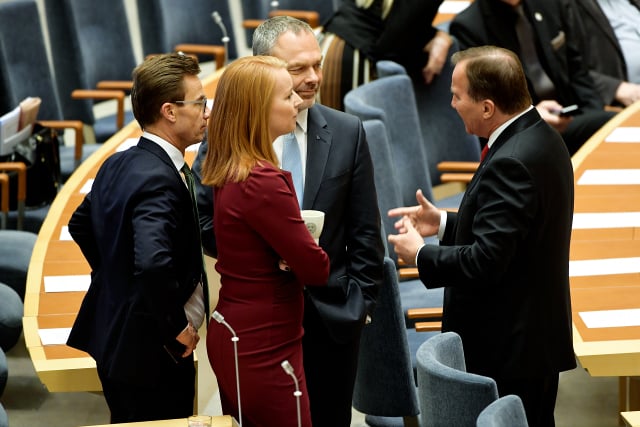What is the Riksdag?
Sweden's parliament – the Riksdag – consists of 349 members who make the country's laws.
According to the constitution all public power stems from the people and the Riksdag is the people's main representatives. Those eligible to vote in the national election – Swedish citizens over the age of 18 who are or have been registered in Sweden – are also allowed to stand for election.
How old is Sweden's parliament?
Older than both democracy and the right to vote, in fact.
Even back in the Middle Ages, kings would call representatives of powerful interests in the kingdom to formal diets. Such a meeting at Arboga in 1435 is often considered the first Riksdag. A century later, King Gustav Vasa (1523-1560) would assemble the four estates – nobility, clergymen, burghers and peasants – and in the 17th century the Riksdag became a more permanent function of society. The 1809 constitution abolished absolute royal rule and stated that power should be shared between King and Riksdag.
How do you get elected?
Sweden primarily votes for parties, not people. But if you really want to vote for a particular person, you can do so if they have given their consent to represent a party. In most cases this means that the party has ranked a list of names on their voting ballot and if you want to give someone further down the list an extra boost and chance to get into parliament you can tick their name on the list.
What does the Riksdag do?
The 349 MPs split themselves up into various committees which act like a kind of mini version of the larger Riksdag. Each committee has 17 MPs who manage areas such as culture, taxation, defence and education. The committees are in charge of much of the day-to-day work.
READ ALSO: What we know so far about Sweden's next government

Stefan Löfven, Social Democrat, and Ulf Kristersson, Moderate, debate in front of 2014-2018 speaker Urban Ahlin. Photo: Henrik Montgomery/TT
How is the government appointed?
The Riksdag votes for a prime minister candidate, who forms the government. If a party has its own parliamentary majority it is a straightforward process: the party votes for its own leader as prime minister and that's that. But in all other situations, the parties have to compromise and work together. The more parties in parliament, the more cooperation is needed. In Sweden you often talk about the two blocs – red (left) and blue (right) – parties that have more in common with each other and tend to vote the same way.
Why does the speaker of parliament matter?
The speaker formally chairs the Riksdag. They almost always come from the party that has the most votes (although this won't necessarily be the case this time – keep reading to find out why), and are assisted by a couple of deputy speakers, usually from the parties that are second and third.
The speaker also makes sure that someone forms a government, because according to the rules, he or she is in charge of putting forward a proposal for who should become prime minister. That is however usually preceded by plenty of discussions behind closed doors.
The speaker has four attempts to get parliament to agree to a new prime minister, or at least convince enough MPs to abstain and not actively vote against the candidate. If they fail to agree, a new election shall be held within three months. So far, parliament has always approved the first proposal.
What happens if there is no government?
A government that does not enjoy the tacit support by a majority in the Riksdag, which could happen in Sweden in the coming days, is allowed to continue working until a new government is in place. A so-called transitional government has in principle the same powers as a regular government, but it may not call a new election and in practice it usually only executes decisions in matters that are already ongoing.
Can MPs vote however they want in parliament?
Yes, there is no law stating that you have to toe the party line. There are several examples of members who have opposed their party on various issues. One such case was the controversial use of signals intelligence in 2008, where Liberal MP Camilla Lindberg went against the party line and voted no. Her colleague Birgitta Ohlsson was also critical, but chose to abstain out of respect for her party.
There are also independents who have left their party and either joined another or just represent themselves. The Sweden Democrat group has a handful of MPs who switched to breakout group the Alternative for Sweden party, which has never otherwise been elected to parliament.
How does it compare to other systems?
In other countries it is common that parliament has two chambers: for example the Senate and House of Representatives in the US, or the House of Commons and House of Lords in the UK. Sweden abolished its two-chamber system in 1971 and has since only had the one chamber.
What happens next?
The newly elected members of the Riksdag will meet for a roll-call at 11am on September 24th. On the same day, they will also elect a speaker. Due to the unusual situation with two very weak blocs (the left wing has 144 seats, the right wing 143, and the far-right Sweden Democrats 62) it looks like the right-wing's candidate will become speaker despite the left-wing Social Democrats being the largest party.
The opening of the Riksdag session on September 25th then formally marks the start of a new term. King Carl XVI Gustaf, who has no formal powers, will attend on the first day to declare the new session open.




 Please whitelist us to continue reading.
Please whitelist us to continue reading.
Member comments